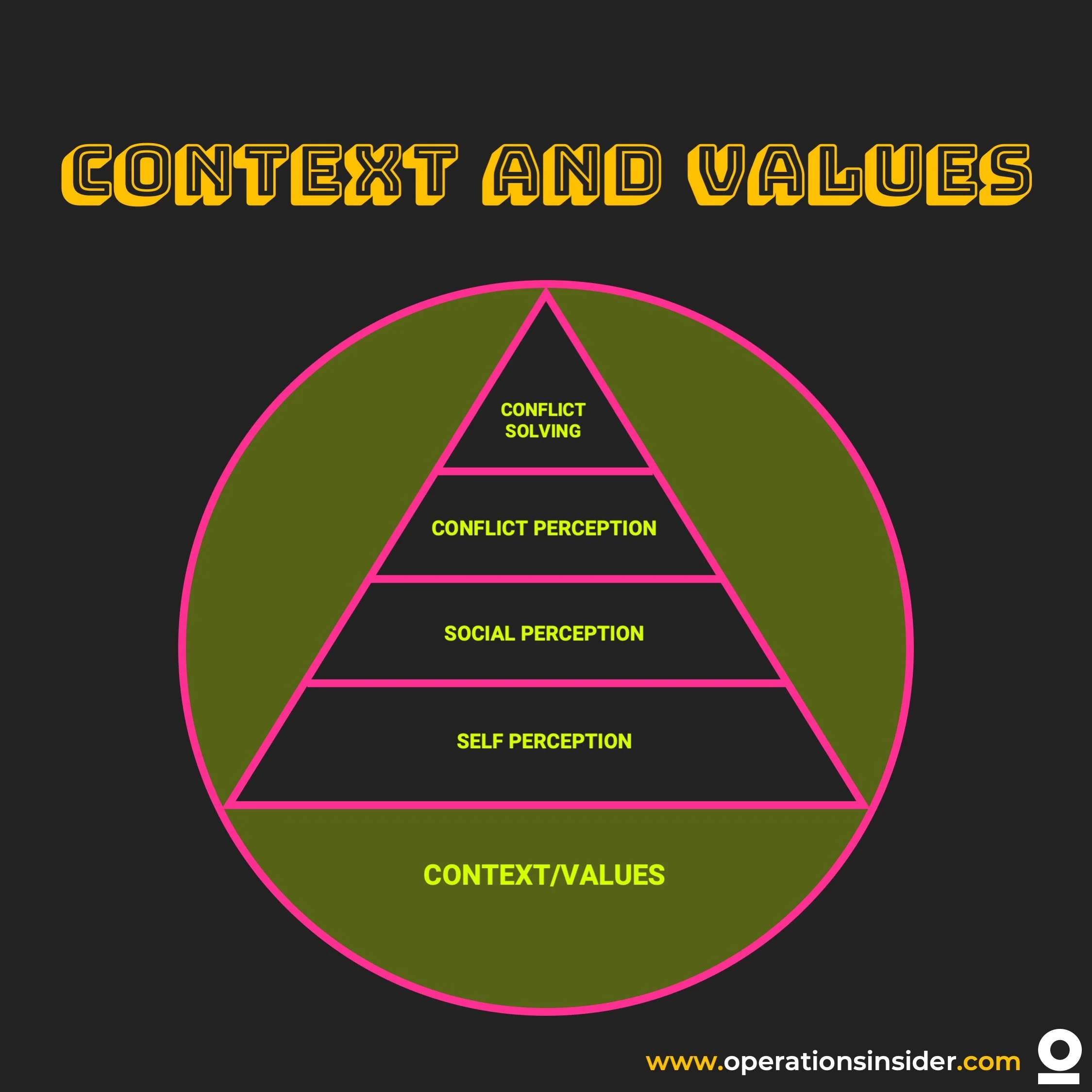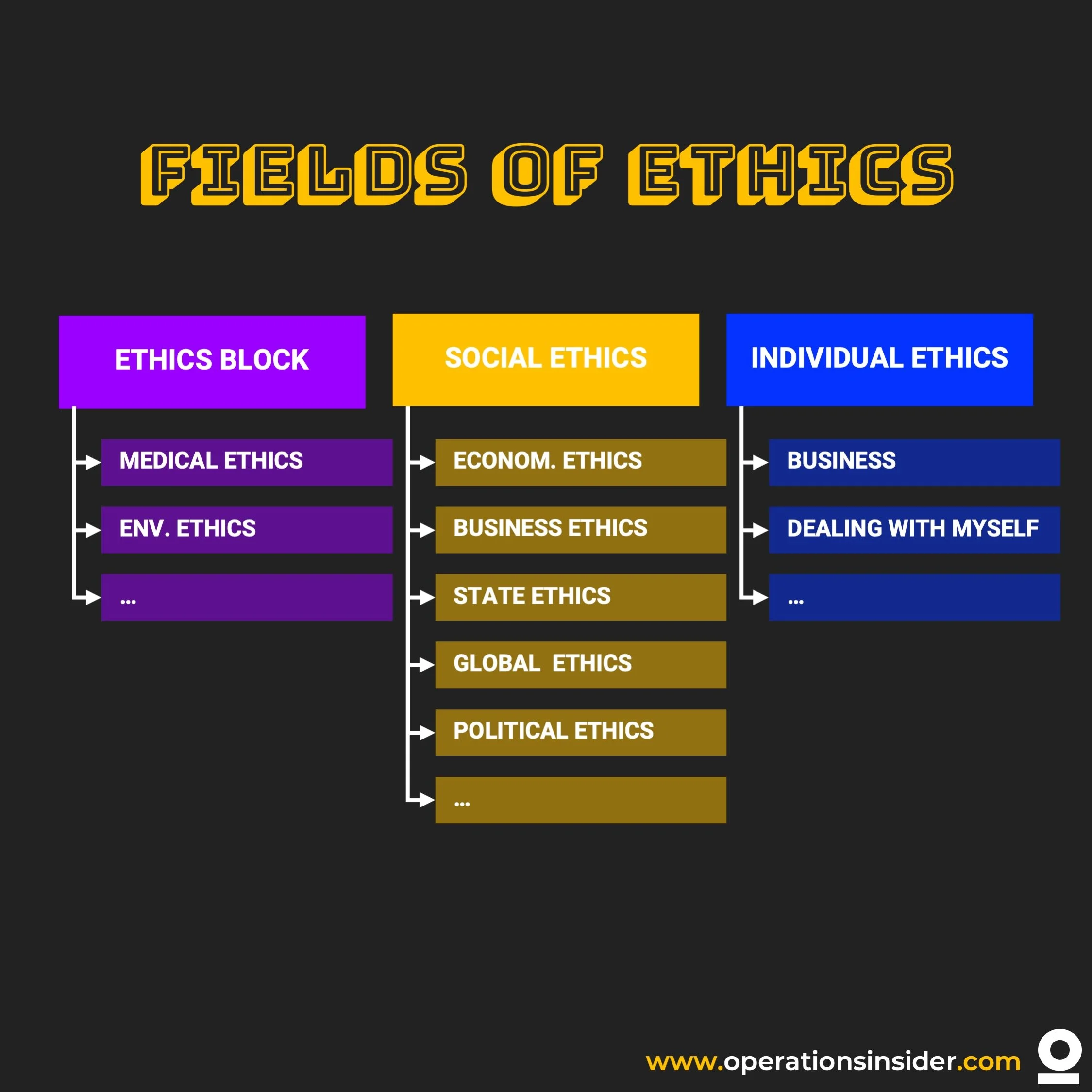
Part 3 - The Pyramid Effect of Social Competence
Managing Individual Social Competence - The Pyramid Effect of Social Competence
The core of our ethical approach lies in the responsibility of the individual, in self management, which encompasses all areas of life. In business, whoever would like to achieve a culture of learning, promote corporate social responsibility, or implement a value-oriented overall concept needs to acknowledge his own “glasses”. Without self-awareness, no growth in skills that are anchored in the personality is possible. Otherwise, they remain as a suit that does not fit, somehow on your body, but not real or authentic. With growing self-awareness, the ability prevails and falls in all areas of communication, goal-setting, the life balance ... especially, however, of conflict management. The effect that currently occurs is best depicted in the form of a pyramid.
According to our conception, conflict management is not primarily a (learnable and teachable) method, but an element of personality development that is constructed on self-perception. Therefore, conflict management must be acquired in a learning process. No one can learn skills integrated into their personality in a course. And of course it does not work implicitly without learned material, methods and examples. Growth in the area of social competence exacts me as a person — completely. Only in this certainly challenging way is enduring personality development possible. The classic location of the primary procurement of social competence, of the ability to live in relationships and to structure these positively and proactively, is the family of origin.
Personal Illustration
The pressure on this “Educatope” has dramatically increased in the last two decades. The primary social dimension, which is becoming smaller and smaller, is hardly in the position anymore to provide the needed competencies to adolescents in the financial sense, by way of the increasing speed of change, and due to the glaring influence of multimedia-based reality. Therefore, the keyword of psycho-social health will be a core subject in the years to come. But because this primary value-provider is overburdened in many aspects, it is that much more important to address the development of personality competencies. A basic principle is (as can be seen in the following diagram) that growth in soft skills always transfers to increases in self competence. “Wash me — but don’t get me wet” cannot be the motto for up-and-coming leaders. Quite the contrary. Only he who presents himself as a role model to his own personality development and also does this in a clear way will be able to develop his employees on an enduring basis.
Part 2 - ABOUT ETHICS
Outline of ethics for this category and conceptual clarification.
Ethics is an enigmatic concept. So that the chameleon does not change its colors quite so many times, we should explain in advance what we mean when we say “ethics”. There is no all-encompassing ethic that always applies. The simple, but yet not simplistic, basic question of ethics goes back to Immanuel Kant and gets to the point: How should I act? Being and striving, the motives and consequences of acting are in the focus of ethics. Also that which brings me out of the usual, the routines, and opens new paths is also a core ethical subject. What are my maxims that lead to action?
In daily language usage, we are confronted with the concept of, ethics* in different ways, but basically in three fundamental meanings:
Ethics and values are simply used as equals. Meaning — we are always ethical and we all have values, which are, however, not primarily distinguished by their being “good or bad”. In this sense, descriptive ethics, which we actually live, are often also seen as the discrepancy between convictions and lived values.
Ethics as valuation: When someone behaves “ethically”, we also say that he has behaved “well” or “desirably”. In this case, ethics becomes a judgmental concept.
Ethics as the super-ordinate concept of a scientific discipline (branches: social sciences or philosophy) — see more about this under the topic “Hyphenated Ethics”.
In order to further tackle the conceptual haziness, we still have to define the concepts, namely ethics itself, as well as ethos and morality:
Morality: the actual norms and rules of a society. It is accepted without reflection and is also primarily culture based and therefore not an active exercise in learning. Motto: “That’s just what is done” — example: Wash your hands before dinner.
Ethos: Greek: housing, stall, tribe, custom, habit. One speaks of a civil ethos or work ethos (example: the management ethos). Ethos therefore means individual or group-specific ethics. Values and virtues that are derived from morals for an individual or a group of people and which are specified for them. Motto: ”That is how I/we do it” — Example: we, as a family, wash our hands before dinner.
Ethics: the theoretical reflection of morality that is then reflected in practice. Grounded and reflected norms and values. Motto: Why should I do certain things? Example: You should wash your hands before eating in order to avoid possible infections.
The concept of ethics as we will use it in the context of this lesson script and also within the framework of the lecture, takes all three reflection and development stages into consideration and means:
Definition:
Ethics is … what has become a (generally accepted) rule in an individual’s life due to habit or tradition or by way of the norm: that is my/our lifestyle, that pertains to me, to us. Ethics can be observed, is personal, but never private.
Hyphenated Ethics — A System
The great ethical systems of philosophies and religions have different conditions and assumptions that lead. to certain values (value mindset). Despite all differences, ethical main subjects can be identified:
Personal Illustration
The ethical fields can be divided into three large blocks. The disciplines named above are present in all of them. Two of these subjects are essential to our theme — business ethics and individual ethics:
Personal Illustration
Stay Connected
Ad
Want to get ahead faster? We are listening to the Blinkist* summaries - because it’s simply the best and fastest way to gain new knowledge.
* = Affiliate Link







